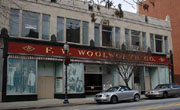VOA标准英语2011--Historic Civil Rights Ruling Marks 50 Years
时间:2019-02-06 作者:英语课 分类:VOA标准英语2011年(十二月)
Historic Civil Rights Ruling Marks 50 Years
Fifty years ago this Sunday, on Dec. 11, 1961, the United States Supreme 1 Court reversed the convictions of 16 black college students who had been arrested in a civil rights demonstration 2 in Louisiana.
It was the high court's first decision regarding sit-in protests throughout the southern states.
The students had been arrested in the state capital, Baton 3 Rouge 4, where they were refused service in two racially-segregated restaurants. After they defied police orders to get up from their seats and leave, they were charged with disturbing the peace.
In his opinion, Chief Justice Earl Warren wrote that the students had been peaceful and quiet and had not violated a law written to prevent a public disturbance 5. He wrote, “There is no evidence to support a finding that . . . the students' . . . behavior disturbed, or could have disturbed, the peace.”
Sit-ins had become a tactic 6 of the civil rights movement in 1960, the year before the Supreme Court ruling, when other black students sat at the previously 7 all-white lunch counters in the Woolworth and Kress variety stores in Greensboro, North Carolina.

The Woolworth’s five-and-dime store is now a civil rights museum.
They were denied service and ordered to leave. When they quietly refused, police were called, and the students were arrested on charges of trespassing 8 and creating a public disturbance.
Sit-ins, or sit-downs, had been used by striking workers worldwide for years. But the idea was new to the civil rights movement. The sit-in in Greensboro inspired a wave of similar tactics throughout North Carolina and then other southern states. Many restaurants were desegregated in their aftermath.
Three years after the Supreme Court ruled sit-ins to be lawful 9, the U.S. Congress passed the Civil Rights Act of 1964, which included a public accommodations section that barred racial discrimination by hotels and restaurants.
The Woolworth store in Greensboro - where it all started - is now the International Civil Rights Center & Museum.
- It was the supreme moment in his life.那是他一生中最重要的时刻。
- He handed up the indictment to the supreme court.他把起诉书送交最高法院。
- His new book is a demonstration of his patriotism.他写的新书是他的爱国精神的证明。
- He gave a demonstration of the new technique then and there.他当场表演了这种新的操作方法。
- With the baton the conductor was beating time.乐队指挥用指挥棒打拍子。
- The conductor waved his baton,and the band started up.指挥挥动指挥棒,乐队开始演奏起来。
- Women put rouge on their cheeks to make their faces pretty.女人往面颊上涂胭脂,使脸更漂亮。
- She didn't need any powder or lip rouge to make her pretty.她天生漂亮,不需要任何脂粉唇膏打扮自己。
- He is suffering an emotional disturbance.他的情绪受到了困扰。
- You can work in here without any disturbance.在这儿你可不受任何干扰地工作。
- Reducing prices is a common sales tactic.降价是常用的销售策略。
- She had often used the tactic of threatening to resign.她惯用以辞职相威胁的手法。
- The bicycle tyre blew out at a previously damaged point.自行车胎在以前损坏过的地方又爆开了。
- Let me digress for a moment and explain what had happened previously.让我岔开一会儿,解释原先发生了什么。
- He told me I was trespassing on private land. 他说我在擅闯私人土地。
- Don't come trespassing on my land again. 别再闯入我的地界了。